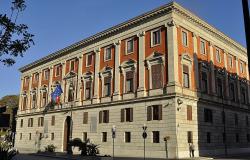A fundamental edition full of intriguing events which this year sees the Monteverdi Festival recognized by the Italian Parliament as an event of absolute international prestige, as the artistic director Andrea Cigni he wanted to remind us at the beginning of the evening.
In this context, the representation of theOrpheuswhich serves as the inauguration of the Festival itself, can be considered a symbolic choice that turns its gaze to where it all began, to that first true masterpiece of Italian melodrama in which the divine Claudio showed the world the dramaturgical and musical potential of this genre .
Olivier Fredj in the director’s notes he questions the truth and how much our gaze is capable or not of modifying it, just as Orpheus’ gaze did, the unwanted cause of the definitive death of Eurydice, who, again quoting the director, would therefore be say similar to the cat of Schrödinger’s famous paradox according to which only the moment of observation puts an end to the coexistence of multiple possibilities. It is the gaze of each of us, therefore, that modifies our identity and our inner vision, it is the gaze of the spectator that allows a representation to exist and at the same time modifies its essence.
The starting point is a philosophically intriguing point of view, but one which in fact does not materialize with great clarity in its definitive stage realization. Some elements appear evident, such as the initial image of a woman shedding rivers of tears into two glasses or the continuous presence of the eye in the suggestive videos projected on the background, or the mirror carried on her back by Speranza which immediately refers to the double theme.
Other details should, however, be better explained so that they do not appear too cryptic or too cerebral, as in the case of the motivation that pushes the use of different clothes for the protagonists, which range from the black tunics embroidered in silver of the shepherds, to the work overalls which refer to the theatrical environment, to then reach the seventeenth-century style clothing that characterizes the souls of the afterlife.
Compared to a first part in which the movements are well studied and calibrated, in the second there is a certain staticity, as happens for example in the Charon scene, which weighs down the execution a little.
The scenography is simple and linear Thomas Lauretwhich essentially consist of wings that recall stylized architecture whose arches lower in the moment of transit from the world of the living to that of the dead, until the final apotheosis is reached which occurs on an empty stage.
The tones of black and gray dominate everything, with the exception of a few flashes of color that characterize the world of the underworld, generating a desired sense of oppression in the viewer.
The reading of Monteverdi’s score offered by is of great quality Francesco Corti at the helm of Tomato especially with regards to the variety of tempos used, now more dilated, now tighter, which allowed him to fully dissect all the density and centrality of the word in music. He is evocative of the richness of timbres and accents which highlights the sad sweetness that permeates the entire musical dictation, enhancing it in the right measure.
On the stage many winners of the first Cavalli Monteverdi Competition 2023 among which stands out Marco Saccadin who plays the role of an intense Orpheus, with a pleasant burnished vocal timbre, always supported by a solid technique and great fluidity of emission.
Crystal clear voice albeit with a non-bursting sound Jin Jayu, who tries her hand at the double role of La Musica and Euridice. Excellent La Messaggera Margherita Sala who exhibits an instrument rich in harmonics, interesting in color and knows how to load his interpretation with the right intensity and pathos.
Next to them the Proserpina and the Pluto of Paola Valentina Molinari And Rocco Liaboth well focused, as is the Charon with his expressive and profound low notes Alessandro Ravasio.
Well La Speranza interpreted by Laura Oruetathe Nymph of more than discreet Emilia Bertoliniconvincing Giacomo Nanni who plays the triple role of Apollo, Shepherd 4, Spirit 3.
Also noteworthy are the tests of Roberto Rilievi (Shepherd 1, Spirit 1), Matteo Straffi (Shepherd 2, Spirit 2), Sandro Rossi (Shepherd 3).
A special mention can only go to Monteverdi Festival Choir – Cremona Antiqua which stands out for its extremely high level of interpretation, precision and extraordinary compactness.
The public was very successful and gave sincere applause to all the artists, both the vocal and instrumental parts, as well as to the director and his collaborators.
The review refers to the June 14, 2024 show.
Simone Manfredini






